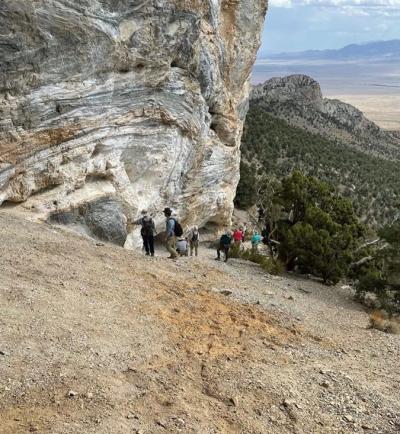“The (not-so) great outdoors: What do students value in a career?”
The geosciences remains by many measures the least diverse STEM field – limiting the impact of our field and effectiveness of our research. Research has shown diverse groups lead to more creative solutions to problems. Therefore, to tackle inherently global challenges, such as climate change, it is imperative to have a diverse community of geoscientists. Why does our field continue to bring in and retain new students from a population dominantly composed of nonminority male students, while other STEM fields attract and retain more diverse students? New data published by Dr. Samantha Carter (SES graduate Ph.D. 2020 and postdoctoral scholar), Dr. Elizabeth Griffith (SES Associate Professor), Dr. W. Ashley Griffith (SES Associate Professor) and collaborators at The University of Texas at Arlington and Kent State University in the Nature Journal “Communications Earth & Environment” (https://www.nature.com/articles/s43247-021-00287-4) suggest that the traditional approach to appealing to students by showcasing the allure of the great outdoors is inherently exclusionary. The study set out to determine what underrepresented prospective students who are more likely to choose other STEM avenues value in an ideal career. Do these values align with portraits of geoscientists presented to prospective students?

“Our paper presents results from surveys of undergraduate students at a Hispanic-serving institution enrolled in College Algebra (the majority of students are STEM majors). In just 5 semesters, we collected surveys from 1550 students, 55.3% were student who identify as minoritized groups that are underrepresented in STEM. This large sample size allowed us to make robust comparisons. Our findings transformed our view of how we might better recruit and retain more diverse students. On average, students cared very little about working outdoors (or in an office). Students overwhelming value “helping people and society” and “helping the environment.” Women rated these higher than men. Interestingly, first generation students do not respond differently – contrary to any broad assumption that they might value “making a lot of money” more than other students. We also find that many respondents know little about what a career in geoscience entails.
Our work highlights the clear need to think differently about how we recruit and retain diverse students in the geosciences. We need to emphasize the altruistic outcomes of the Earth Sciences - how careers in the geosciences help people, society, and the environment - in order to attract a diverse workforce in the Earth Sciences.”
